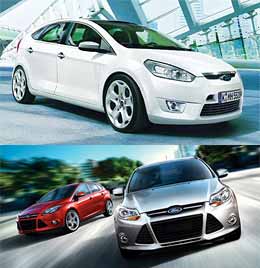| |
Ford Focus Plug-in Hybrid
The 2012 Ford Focus will be offered as a gasoline model, all-electric
or Plug-in Hybrid. Ford will keep the Focus on the outside looking
pretty much the same while the guts of the vehicle uses leading
edge automotive technology. Purely electric vehicles are making
a comeback, but will they survive the onslaught from PHEVs (Plug-In
Hybrid Electric Vehicles)?
Electric vehicles were introduced years ago, however, due to
limited battery technology and driving range, the vehicles faded
quickly into obscurity. The question remains whether companies
like Ford and Nissan can abate consumers' fears in electric
vehicles? The answer is yes, if the consumer understands the
limitations of the all-electric vehicle. The answer is yes again
when consumers choose a Ford Focus PHEV which is only partly
battery powered and partly motivated by a small gasoline engine.
Design
Unfortunately, the design is only a slightly more modern looking
Ford Focus, outside of the new front grille, there isn't much
to discuss as Ford has chosen to keep the same appeal for its
PHEV, all-electric and gasoline counterparts. The interior dash
board and media center are high tech, yet they conform to old
designs, instead of breaking free of the traditional placements
and mountings.
Technical Specifications
One of the negative factors of a purely electric vehicle (EV)
is that anything electric consumes the battery and therefore
the distance on which you can drive. Therefore things like air
conditioning, radio, television, gps, etc all lend to fears
of depleting the energy reserve and being stranded. This leads
straight into the number one fear of consumers, running out
of power (or range anxiety as some call it).
As it can take several hours to recharge a battery, what happens
when you get stranded on the side of the road? The answer is
a tow truck, unfortunately. The Ford Focus, just like the Nissan
Leaf, will only attain an approximate 100 mile range per charge.
With such limited mobility, many families and commuters will
avoid all-electric vehicles.
The main benefit and attraction to purely electric vehicles
is the environmental impact - no CO2 emissions from driving,
which means a separation from our reliance as gasoline for fuel.
Most likely, purely electric vehicles will be a hit for city
folk, home bounds, and taxis with limited range.
Once you weigh the benefits of a purely electric vehicle, price,
and other plug-in hybrid models, it makes you wonder why anyone
would purchase a purely electric vehicle. All new plug-in hybrids
are outfitted with switches to purely electric driving and you
only need to switch back when the battery is low.
The second benefit to a PHEV is the range, usually 400 to 600
miles on a tank of gas and a charge of electricity. Lastly is
the price point, even with the federal governments tax rebate
of up to $7,500 - it barely makes it less than diesel hybrid
vehicles. The Ford Focus is priced at $30,000 (before taxes,
fees, and rebates).
In conclusion, electric vehicles are ideal once their range
limitations can be lifted, but also, once the method in which
we generate electricity is altered. Right now, most electricity
in the United States comes from coal fired power plants, which
are extremely toxic and create CO2 emissions, thereby counteracting
the electric vehicles eco-friendly state. Diesel hybrids are
poised to take over the market as they assuage consumer fears
and still help to protect their wallets, the environment, and
provide the same look and feel of driving a powerful vehicle
(as electric vehicles lack torque and speed).
At this point, Ford has not released a lot of information about
its Focus electric, PHEV or gasoline models. In a couple more
months all should be clear.
|
|

